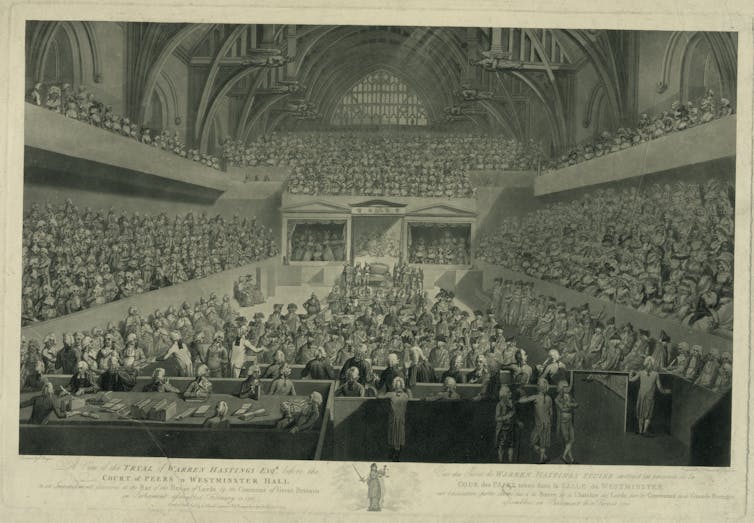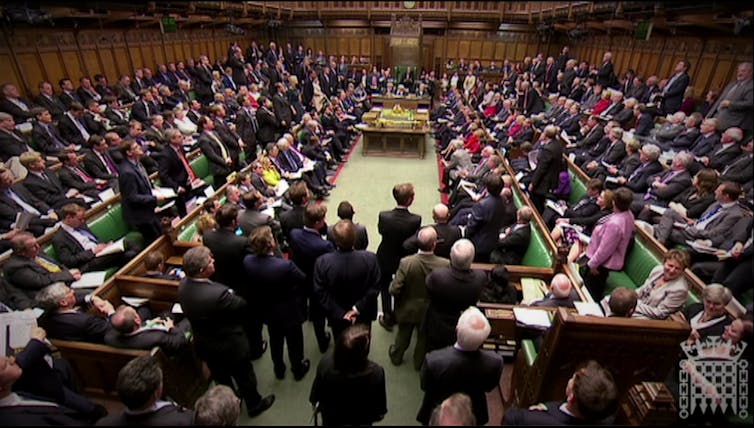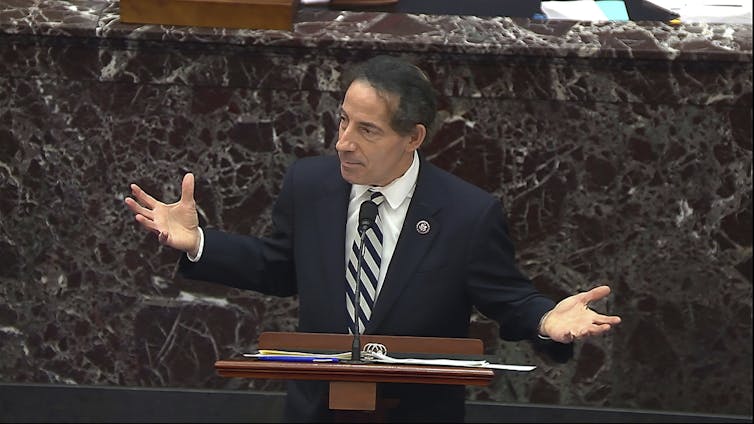
Experts in autocracies have pointed out that it is, unfortunately, easy to slip into normalizing the tyrant, hence it is important to hang on to outrage. These incidents which seem to call for the efforts of the Greek Furies (Erinyes) to come and deal with them will, I hope, help with that. As a reminder, though no one really knows how many there were supposed to be, the three names we have are Alecto, Megaera, and Tisiphone. These roughly translate as “unceasing,” “grudging,” and “vengeful destruction.”
As I’ve been saying, I have a number of articles saved regarding how white supremacy thinks, when it increases, how it expresses itself, and so on – and especially, what to do about it. I hope to get to all of them eventually. This is not one of them – but it is about accountability, which, like democracy, is not threatened.
The United States is not the first nation to have established an impeachment process. Neither are we the first nation to learn that, as a process to achieve accountability – well, let’s just say it is far from perfect. Here’s a little history so that we can consider similarities and differences.
================================================================
Why the British abandoned impeachment – and what the US Congress might do next

Library of Congress
Eliga Gould, University of New Hampshire
Impeachment was developed in medieval England as a way to discipline the king’s ministers and other high officials. The framers of the U.S. Constitution took that idea and applied it to presidents, judges and other federal leaders.
That tool was in use, and in question, during the second impeachment trial of Donald Trump. Republicans raised questions about both the constitutionality and the overall purpose of impeachment proceedings against a person who no longer holds office.
Democrats responded that the framers expected impeachment to be available as a way to deliver consequences to a former official, and that refusing to convict Trump could open the door to future presidential abuses of power.
An impeachment case that was active in Britain while the framers were writing the Constitution in Philadelphia helped inform the new American government structure. But the outcome of that case – and that of another impeachment trial a decade later – signaled the end of impeachment’s usefulness in Britain, though the British system of government offered another way to hold officials accountable.
Impeachment in Britain
During the 17th century, the English Parliament used impeachment repeatedly against the royal favorites of King Charles I. One, Thomas Wentworth, Earl of Strafford, went to the gallows in 1641 for subverting the laws and attempting to raise an Irish army to subdue the king’s opponents in England. Although kings couldn’t be impeached, Parliament eventually tried King Charles I for treason too, sentencing him to death by public beheading on Jan. 30, 1649.
A century later, impeachment no longer carried a risk of execution, but in 1786 the House of Commons launched what would become the most famous – and longest – impeachment trial in British history.
The lower house of Parliament, the House of Commons, impeached Warren Hastings, who had retired as governor-general of British India and was back in England, for corruption and mismanagement. That action provides a direct answer to one current legal question: The charges were based on what Hastings had done in India, making clear that a former official could be impeached and tried, even though he was no longer in office.
Future U.S. president John Adams, who was in London at the time, predicted in a letter to fellow founder John Jay that although Hastings deserved to be convicted, the proceedings would likely end with his acquittal. Nevertheless, Adams and Jay were among those who supported the new U.S. Constitution, whose drafters in 1787 included impeachment, even though that method of accountability was close to disappearing from Britain.
Nearing the end of its usefulness
The trial of Hastings, in Parliament’s upper house, the House of Lords, didn’t actually begin until 1788, and took seven years to conclude. The prosecution included Edmund Burke, one of the most gifted orators of the age. Eventually, though, the House of Lords proved Adams right, acquitting Hastings in 1795.
This stunning loss could have been the death knell for impeachment in Great Britain, but Hastings was not the last British political figure to be impeached. That dubious honor goes to Henry Dundas, Lord Melville, Scottish first lord of the admiralty, who was charged in 1806 with misappropriating public money. Dundas was widely assumed to be guilty, but, as with Hastings, the House of Lords voted to acquit.
These examples showed that impeachment, even when the accused government official had done the things that he was accused of doing, was a blunt, cumbersome weapon. With both Hastings and Dundas, the House of Commons was willing to act, but the House of Lords – which was (and is) not an elected body and therefore less responsive to popular opinion – refused to go along. As a tool for checking the actions of ministers and other political appointees, impeachment no longer worked, and it fell out of use.
A new method of accountability
The decline of impeachment in Britain coincided with the rise of another, more effective process by which high officials there could be held accountable.
British prime ministers answer to Parliament, doing so literally during the now-weekly question time in the House of Commons. Leaders who for whatever reason lose the support of a simple majority in the lower house, including through a vote of no confidence, can be forced to resign. The last time a British prime minister lost a vote of no confidence was in 1979, when the minority Labour government of James Callaghan was defeated.

U.K. Parliament via Wikimedia Commons, CC BY
If a prime minister receives a vote of no confidence, there is an alternative to resignation: call an election for a new Parliament, which is what Callaghan did, and let the people decide whether the current government gets to stay or has to go. If the prime minister’s party loses, he or she is generally out, and the leader of the party with the new majority takes over. In 1979, the defeat of Callaghan and the Labour Party paved the way for the Conservative government of Margaret Thatcher, Britain’s first female prime minister.
This provides an immediate course of action for those who oppose a British government for any reason, including allegations of official wrongdoing, and delivers a rapid decision.
[Like what you’ve read? Want more? Sign up for The Conversation’s daily newsletter.]
In the United States, by contrast, a president can be accused of corruption or even sedition but face no real consequences, so long as one more than a third of the Senate declines to convict.
Now that Trump has been acquitted, then the Constitution’s bulwark against presidential malfeasance could become yet another mechanism of minority government.
Another path
If impeachment is rendered useless in the U.S., as it was in Britain two centuries ago, the Constitution does offer another remedy: Section 3 of the 14th Amendment.

Senate Television via AP
Originally intended to prevent former Confederates from returning to power after the Civil War, Section 3 bars people who have “engaged in insurrection or rebellion” against the U.S. from serving in state or federal governments, including in Congress or as president or vice president.
The language in the amendment could justify barring Trump from future office – and the resolution to do so may require only a majority vote in both houses of Congress, though enforcement would likely also need a ruling from a judge.![]()
Eliga Gould, Professor of History, University of New Hampshire
This article is republished from The Conversation under a Creative Commons license. Read the original article.
================================================================
Alecto, Megaera, and Tisiphone, I don’t think it requires a whole lot of logic, or imagination, to see that instituting the option of a vote of no confidence (or the equivalent) would not work well here. I think the most obvious reason is that, in those nations which use it, there are at least three active political parties, so that it is impossible to govern without forming some kind of coalition with someone. Here, a vote of no confidence would be essentially the same as a recall election. And, if you have ever lived through one of those, you know how dangerous those can be. And particularly with no consistent media delivering facts.
Further, a vote of no confidence, like impeachment, is a political tool. What we need today (and would have benefitted from having for the last four years) is a legal tool. The decision that no sitting president can be prosecuted for crimes is based on one legal opinion almost fifty years old. Some of us thought it wrong at the time. Many thought it wrong during the events of the last four years. Yet it is held as sacrosanct.
I am not a lawyer nor a legislator myself. But might Congress not consider writing and passing a law along the lines that no one in the Federal Government, elected or appointed, can be considered immune from prosecution for any Federal crime, or any State crime committed under that State’s jurisdiction, even while in office? Because that’s what we have needed, and I guarantee we will need it again. (Actually, we need it already. I’m confident Nameless will concur and have a suggestion.)
The Furies and I will be back.
13 Responses to “Everyday Erinyes #254”
Sorry, the comment form is closed at this time.

We could learn a lot from other countries, and not just better ways to govern ourselves and hold our leaders accountable for unethical actions. And don’t get me started on our so-called health care system!
Brilliant analysis, Joanne, as always. I’ve shared it on Twitter where somehow I’ve acquired 15.5k followers and friends during the four years of the Tangerine Toddler’s alleged administration. I think you’re right, impeachment is an ineffective tool, as we’ve just demonstrated yet again, but we do need a means to hold former officials accountable and to prevent them from ever again holding office. This is the answer. Thank you. :^) gene
Something else I’d like to share with you all. I came across this child, I think she’s 11 in this video, she has her own YouTube channel, just the most amazing young performer I’ve seen in a long time. The passion and joy with which she plays is wonderful to see. It is an amazing thing to find the thing you love so young and the once in a generation talent to do it this well. The way she moves as she plays is unique in my experience. I hope you enjoy her as much as I do. Has a very nice Instagram too. Karolina Protsenko, she’s been in America since she was six. I hope we can keep her. :^) gene
https://youtu.be/h1Pa2QW2VyU
There are a surprising number of classical artists also working with various flavors of popular bands. Rachel Barton Pine’s work with Earthen Grave. The Duo Black Violin And way more than I can think of. Perfomnce Today can get repetitive sometimes, but it is very good at telling its audience what all the artists it features are involved in, and that knowledge can be hard enough to come by that I don’t mind a little repetition. “From The Top” also – featuring as it does young artists – is not shay about sharing the multiple interests of its performers. The mix of instrument playing and choreography is a form f crossover that I also haven’t seen before. But I’ll bet I will again.
An excellent post, and yes, “We could learn a lot from other countries,” if we wanted to, but we are too deep into the myth of american exceptionalism to consider such a reasonable thing.
thank you
Great and very informative article, Joanne.
I too feel that our country could learn a lot from the way other countries address these important issues.
We certainly need to come up with a some sort rules/acts. to punish politicians who have committed any type of illegal acts while in office.
We’ve learned that our current method for impeachment. has failed us royally; with all that took place with tRump both times.
Thanks Joanne
Thanks Joanne–a good idea yet I fear it would be as difficult to enact as building a viable third party here–at least until the power of corporate money has been stripped out of elections. Did appreciate reading the relevant history, too.
From experience, I can say that a vote of no confidence can get a minister to resign or a government to topple but has little to do with accountability. There are no personal charges laid and the minister may become a back-bencher, and in that case, still won’t be held to account for serious crimes. And I’ve seen new ministers who had to resign on a vote of no confidence shortly after elections on cases handled badly by their predecessor. Politics of the worst kind.
I think politicians should be held accountable by the judicial branch of government, but then you would need a truly unbiased, impartial jurisdiction. And where can you find that these days?
Yes, we think alike. Through the judicial system. so that ther e are consequences. consequence culture. And no, it is not truly impartial. But on the whole it’s still probably better than the Legislative or the Executive branches – not that there aren’t some real heroes there also.
Very Interesting, JD. So since impeachment doesn’t work, how about King Charles solution. Republicans might be better for America if they are a head shorter!
You’re right. The suggestion was not serious. Classify it as a wet dream!